
In memoriam - Deaths I have grieved
How lucky I am to have had something that makes saying goodbye so hard.
Milton Jackson, 1972
Chapter Advisor to Sigma Chi Fraternity while I was President. His no-ego dedication to helping others was unusual to see at that time and has guided me since. He died of cancer when I was still in college.
Delta crash, August 2, 1985

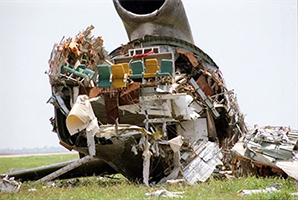
Heard about the crash on TV, the plane was slammed down by a microburst and rode across the freeway and bounced into the tarmac field. That evening, met a friend at a bar, but I was too uncomfortable. I left early, just too distraught over the death and suffering. Felt helpless - what can I do to help?
Larry Lewis, Student, 1992?
I met Larry at AMHS, the Performing and Visual Arts High School in Dallas. Freshman fibers with Wanda and drawing with me. Soon after, Wanda and I 'adopted' him. He had a great enthusiasm for life. A certain zest, sparkle, sweet, and a great smile. A face that says Hey, I'm okay. No fear. No threat. Just me. Come on in.
Family: Divorced Mom's house southwest of Fair Park in South Dallas: siblings sleeping on sofas and beds. Roaches in kitchen. He stayed someplace, he never said he lived there.
His racist father: I often gave Larry a ride home from school or wherever we went after school. But when we got near where he was then staying, his father's house southeast of Fair Park, he insisted on being let out at the street corner. I asked him why, he said that his dad was a racist and he hated white people. It seemed he was afraid for me and his dad to get together. I obliged him with this for several other visit drop-offs, But finally, I just told Larry, No, I'm gonna take you home and I'm gonna go meet your dad. I insisted. We got to his dad's house and Larry said he was not going to go in - he thought it would be ugly. He said he was gonna wait in the car. I said, Okay, fine. I went up and knocked on the door. A somewhat large black man answered and I told him I was Larry's teacher and wanted to meet him. He opened the door and let me into a room that had a Dallas Cowboys poster on the wall, a bed, a card table, and a folding chair. He sat on the bed, I sat in the chair, and we talked. For almost 30 minutes. We had some things in common - we both liked the Dallas Cowboys and we both loved Larry Lewis. We laughed and drank a beer. His dad appreciated the respect that I showed and that I was helping his son. There was no black and white, there were just two men hanging out and talking. I walked back to the car and Larry was a little bit surprised that it had taken so long and he said how did it go. I said it went great, we had a good talk, and we had a good time. The next day in school, Larry came up to me and he said, "My dad hates white people, but he likes you."
Siblings: Johnny founded & owned martial arts business at Buckner/Northcliff, Philip (under bridge), Susie (college grad).
On the way to school, Larry saw a car stuck on the icy street, "Pull over!" Larry got out and helped push the car.
A doctor told Grams to restrict her diet due to cholesterol and diabetes. Wanda: "I wish I had let her eat what she wanted. I wish I hadn't restricted her diet. She loved hamburgers." Larry: "She had them." Larry had gone to the store to get the hamburgers.
Wanda got him into the Electrical program at the New Braunfels Job Corps. Larry had a good mechanical and electrical mind.
We threw him a birthday party at his Madison HS teacher's house. I gave him a weed whacker for his lawn care business.
Larry stayed with Wanda, we remodeled her kitchen, her mother died in 1987.
July 1984: he took me to the phenomenal Michael Jackson concert at Texas Stadium. Webster was in the audience.
After 1987: He got a girl pregnant, Wanda kicked him out, Larry moved in with the girl, had another child. Got married.
Johnny: He was killed in a botched robbery attempt.
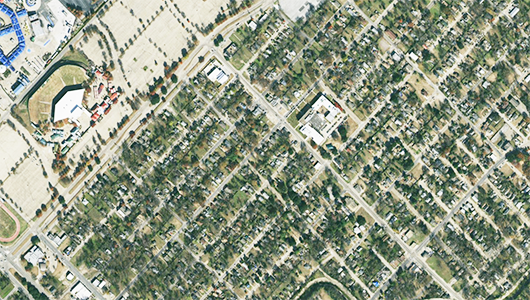
Laird McDonald, Best friend, Friday, March 25, 1994
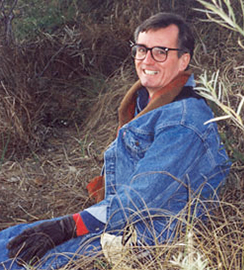
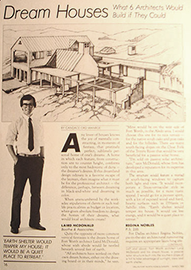
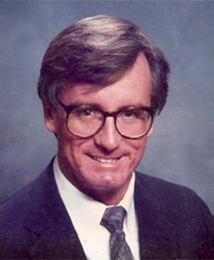
I met Mitchell Laird McDonald at the beginning of my junior year, fall of 1966, at Hillcrest High School in Dallas. I had gone to a meeting of the Art Service Club to get involved with designing sets for the pep rallies, plays, and the spring musical. A group of us formed to work on the musical, The King and I, to be presented later in the year. I had been selected by the art teacher, Ms. Hudson, to design the sets. Laird was a sophomore who came along with his good friend, Barbara Smith, who lived a block from Laird. Through the after-school sessions of working on that set, we all became great friends - me, Barbara Smith, Laird McDonald, Allen Smoot, Abe Frishman, Becky Kennedy, Chris Chernoff, Joe Chapman, Ann Kilby (daughter of the inventor of the computer chip at Texas Instruments), and several others. What a fun time. Laird and I shared many interests that we would explore over the next few decades - architecture, travel, design. After high school Barbara and I went on to the University of Texas. Laird, still a high school senior, would often visit us in Austin. We would all take weekend trips together. During the summers in high school and college, we all worked and carpooled to Six Flags. We operated rides and had a blast working in the park in the late 60s. Below: Barbara (Smith) Grant's house with her new puppies:
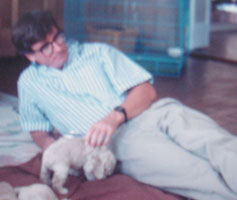
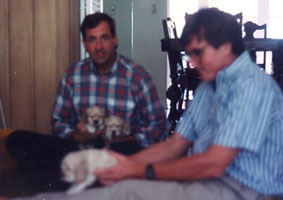
Laird's hometowns
Birth: December 27, 1951
1951-69 Dallas
1969-74 Lubbock
1974-75 Dallas
1975-79 Corpus Christi
1979-86 Ft. Worth
1986-94 Dallas
Death: March 25, 1994
School and career
Laird studied architecture at Texas Tech University in Lubbock from fall of 1969 to spring of 1974. He worked as a licensed residential architect in Ft. Worth, working on large houses and several facilities at Fossil Rim, the animal preserve near Glen Rose, west of Ft. Worth. He embraced a Texas vernacular style - limestone, tin roofs, wide verandas, and light colors. Later, when the sour economy hit architecture firms hard, he worked as a draftsman for firms in Dallas. Below: Article in Dallas-Fort Worth Home & Garden March 1983:
Road trips
Laird helped me move to Oklahoma in 1987. We spent many semester breaks journeying on road trips. These trips were the absolute highlights of my life - the road trips, the sights, the intellectual conversation, the fun.
Of anticipation of time with friends, Laird was the one I looked forward to the most.
• San Antonio, Interurban trail to Waco, with Jerry Landers, May 1986
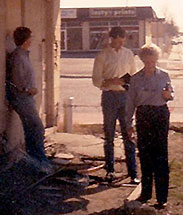
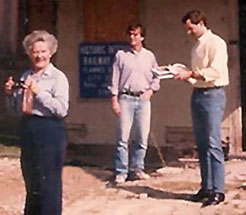
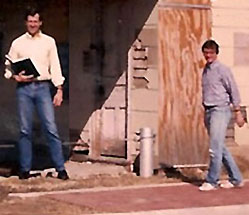
• Exploring the Interurban station ruins in Plano, Texas, 1987.
• El Paso, Cerillos, Magda & Damien, West Texas, June 1987
• Tulsa, Edmond, Oklahoma City; July 4 1987
• Santa Fe, Rebecca Kennedy, Jerry Landers; October 1987
• Acapulco; January 1988
• Dallas; March 1988
• Dallas/Edmond/Dallas; December 1988
• Springfield, Branson, Eureka Springs; May 1989
• Kansas City, Lawrence, Manhattan, Abilene; October 1989
• Route 66, Albuquerque to Los Angeles, Rose parade, Ventura, Disneyland, Phoenix, Route 66; January 1990
• Route 66 to Chicago, Springfield, Peoria; August 1990
• Cincinnati, Indiana, Pennsylvania, Fallingwater, Baltimore, Washington DC; May 1992
• Colorado, Denver, Boulder, Oregon Trail, Yellowstone, Denver; August 1992
Diagnosed with cancer: November 1 1992
• Waco, Austin; March 1993
• Route 66, Monument Valley, Zion, Las Vegas, Grand Canyon; May 1993

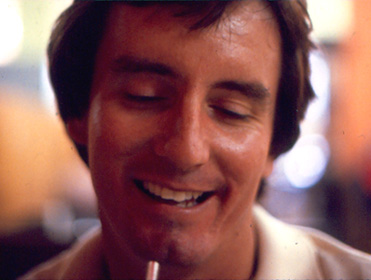
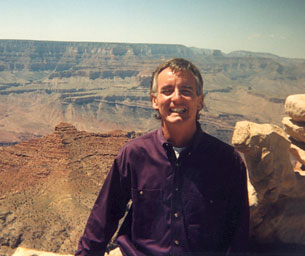

• Dallas; December, 1993
• Dallas, spring break, final visits; March 1994
• Monday, March 21: we watched the Academy Awards with his mother and cousin Janet.
• Wensday, March 23: "I can't keep up." We sat and talked.
• Thursday, March 24: He asked me about my favorite memories and held my hand. I later took a walk around his naborhood. Spent some time with his mom "you're one of my boys." and Janet. Hugged Laird goodbye and left for Oklahoma.
• Friday, March 25: Janet called me in OK to tell me of Laird's death that afternoon.
Discussions
We discussed design, religion, and life. We would often redesign whatever environment we were in - constantly striving to make a place better. Laird and I once redesigned the furniture layout of a hotel lobby in Arlington, Texas. We got permission from the manager and moved the rugs, planters and furniture to improve the traffic flow, create some focal points, and provide a better sense of place for the lobby.
Laird once wrote that there were four major pleasures of life:
1. being loved by others
2. feeling satisfaction through good work
3. experiencing intimacy
4. enjoying the wonders of nature and of man
And four minor ones:
1. spending time with friends
2. raising children
3. having pets
4. material possessions
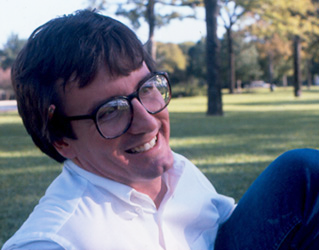
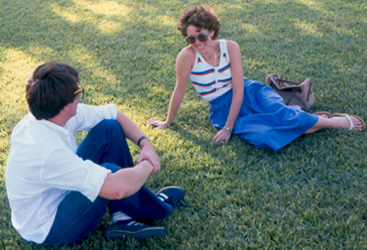
Kathy Riley. Below: Jim, Chris Chernoff, Barbara Grant, Laird at Barbara's. Laird, Barbara, Chris, Ms. Hudson, Jim, 1993
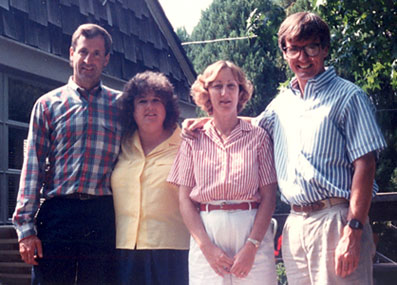
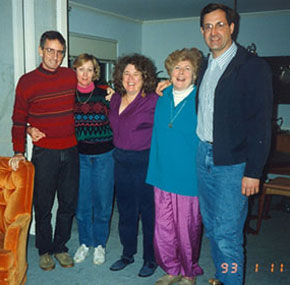
Cancer
Laird was diagnosed with colon cancer in November of 1992 at the age of 41. He fought it for a while with chemotherapy. The tumors finally constricted his colon and he starved to death. Laird died at 3:45 on March 25, 1994. He died peacefully in his sleep with his mother at his side (his father had died a few years earlier). I had been with him, his friends, and his mother for several days while in Dallas for spring break. He was becoming a bit incoherent so I left to return to Oklahoma - he died the next day. His mother took her son's cremated ashes and moved to Oregon to be near her two daughters. She died there in January of 1999. Over time, I realized that Laird had become my confidant and my best friend. While our relationship was strictly platonic, Laird was probably my soulmate, although he died before I realized it or could find out. I went through some depressing times missing my best friend. Though it may sound pessimistic, I have accepted that I will never have another friend as good as Laird McDonald. I will always miss him and our friendship.
Quote from Laird's Celebration of Life party in April of 1994:
Whatever you can do or dream you can do,
Begin it.
Boldness has genius and power and magic in it.
Begin it now.
Murrah Building Bombing, April 19, 1995
Margaret Remmel Johnson, Maternal Aunt, December 10, 1998
I have many fond memories of my favorite aunt. She could always make me laugh (and I her). I have long admired her energy, her enthusiasm, and her great zest for life. She sure lived life to its fullest. She will be an inspiration for me when I am older and faced with deciding how to spend my time. Will I sit or will I move? Margaret moved. Always willing to see new things, go new places, and meet new people. I share that philosophy. (Maybe I got some of that through the Remmel genes?) I think her zeal may be due to her having experienced so much.
I think of her often. And Fox Avenue visits, Westby farm trip, her visits to Dallas and holidays with her as part of our family. During my last visit to Madison (after the Door County reunion), Margaret and I took a long walk through a neighborhood that she wanted me to see (I do not remember where it was, but Chuck and Jean had lived in that neighborhood at one time). We had seen the Fox Avenue house where I got out to walk down to the railroad tracks because of many fond memories there. We had a good talk about her friends and her life in Wisconsin (she really loved Madison). I always enjoyed spending time with her. A great woman that will be missed. Bye, Margaret, I loved you. Died December 10 1998
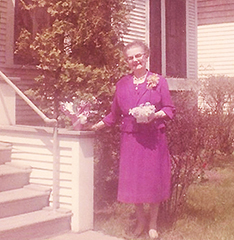
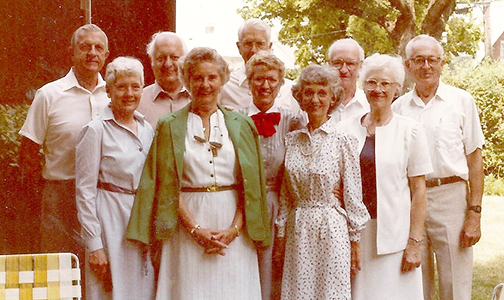
Professor Charles Churchill Watson, Uncle, July 29, 2000
• Born: Madison, Wisconsin, October 18, 1911. Eldest son of James, Professor of Electrical Engineering, University of Wisconsin, and Ethel Churchill, church organist and piano teacher. Graduated from Wisconsin High School in 1928. Bachelor's Degree: Chemical Engineering, UW, 1932. Master's and Doctorate: Physical Chemistry, UW, 1936: Sweden, post-doctoral studies, The Swedberg at the University of Uppsala. Supervised installation of the first Swedberg Ultra-Centrifuge in the US at DuPont in Wilmington, supervised building of the Centrifuge Laboratory at UW.
• He later accepted a position with Universal Oil Products Co, Chicago. 1941: married Jean Mathews (an artist and teacher) daughter of Ella and Howard Mathews, Chair, Department of Chemistry at UW. They lived in Evanston, IL; Midland, MI; UOP in Cotton Valley LA and Corpus Christi TX during WWII. 1946: son, Richard (Rick) Mathews Watson, Madison.
• 30 year teaching career, noted for concern for students, and for giving them an appreciation for the practical work of the chemical engineer in industry. Awarded Award for Excellence in Teaching of Engineering by the College of Engineering.
• He did extension teaching at UW Milwaukee, participated in the liaison of the College of Engineering with Wisconsin industry, and consulted in what might be called "forensic engineering", specializing in cases involving explosions and fires. In some of these cases, he collaborated with father-in-law Dr. Mathews, researcher in forensic chemistry and firearms identification.
• Prof. Watson had a lifelong interest in choral music - sang with the Apollo Club of Chicago, often performing with the Chicago Symphony. Though a Presbyterian, he sang with the choir of St. Andrew's Episcopal Church, Madison, for more than 20 years. Prof. Watson retired from UW in 1976, and he and Jean moved to Indian Hill (Cincinnati) in 1990 to be near their son, Richard.
• Prof. Watson, 88 years old, died July 29, 2000, at Milford, Ohio. Survived by his son Richard, Georgetown, OH and brother James Watson, Dallas. Preceded in death by wife Jean, 1992, parents, and brothers Robert and Richard. Interment in Forest Hill Cemetery, Madison.
Conor Henderson, Student, November 23, 2002
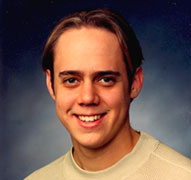
Conor Henderson was a student in Graphic Design 1 during the fall 2002 semester. He had a delightful spirit and zest for life. Conor was committed to becoming a designer. He was very creative and touched all who had the pleasure to know him.
Born in 1978, Conor was killed in a car crash on Broadway Extension during the early morning of Saturday, November 23, 2002. He was alone in the car, no other vehicles were involved, and he probably died instantly. Conor was 24 years old. His death deeply affected many. As his teacher, his life and death certainly changed my life. It was very difficult to go back into the classroom and not have him there. Therapy, medication, and talking with friends helped me overcome the grief. I doubt I'll ever forget Conor Henderson.
Someone had maintained a flower and cross marker at the site of his crash and death from his death until the road was widened and the median was paved over. I acknowledge it and think of Conor when I pass that spot. It reminds me of the fragility and preciousness of life and to continue to work at honoring him in my attitude and behavior.
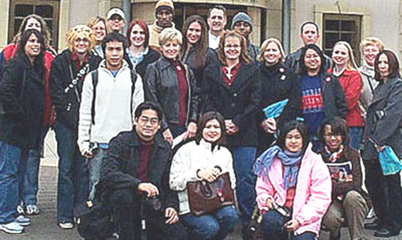
Photo of design field trip to Tulsa, fall semester, outside the Philbrook Museum. Conor is in the back row, on the right. Other students from his Graphic Design I class are scattered throughout the photo. Below: We stopped for lunch in Tulsa. In the left foto, Conor is at the back corner, looking at the camera:
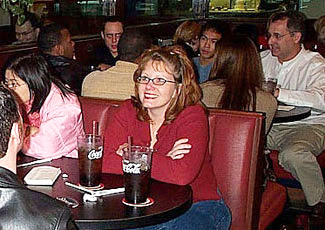
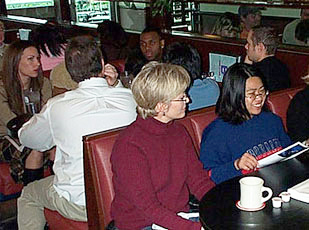
Excerpts from final handout in Graphic Design 1 December 2002
Graphic Design 1 is over
The semester ended sort of abruptly. We didn't get a chance to say goodbye. We had quite a journey, quite a ride since we took off in August. Conor didn't get to finish with the rest of us. And the rest of us didn't even get to officially finish the ride. This handout is to help provide some definite closure that the course is over.
I will see you again, but it won't be the same. I won't have any of you in such a studio class again. We will pass in the hall and I will review your portfolio before Graphic Design II, but it just won't be the same. I have many fond memories of this GDI group. Thank you.
Logo design
Because we lost 3 class periods - migraine, Conor, and no exam week class. We didn't get to talk about logo design much. You will have more chances in later courses to practice identity design. Remember the keys: logos are identities, not ads; design and critique from the target's point of view; strive for clarity; strive for memorability; and integrate type and image.
Save all your art & design work
New procedures require you to pass a portfolio review with the design faculty before enrolling in Graphic Design II. Keep all your good work from Drawing, 2D Design, Graphic Design I, Illustration, and Computer Graphics I. More info and details on this review will be posted later.
Neurobics
You have turned in your last Neurobics form, but I hope you never finish doing neurobics. I hope personal efforts to broaden your horizons will become part of your lifestyle.
Course finale
As a result of your being in Graphic Design 1 and the bumpy ride we took together, I hope your eyes have been opened: you see differently, you think differently. I hope you now solve problems more thoroughly and efficiently. I hope you better understand the process of design. That list really was too long.
Therapy update
I had a good visit with a therapist. What I learned:
• I am very sensitive. Because I choose to be single, students are my 'kids'. But the therapist reminded me that being caring and sensitive was a good thing. The alternative would be worse (callous, cold, uncaring, etc.)
• I never got closure with Conor, never got to say goodbye, good luck, take care.
• There are no time limits to grieving.
• I may be too hard on myself - too much of a perfectionist - I'm going to get Conor to help me work on this. He will remind me to lighten up a bit.
• Walking back into room 102 was tough. I apologize for leaving you alone during the final. I was very uncomfortable in the room at that time, especially since I went in at 10am and said, "Who are we missing?" (Oops).
• Its okay to cry. One therapist (I've seen two) thought it was cool that I role-modeled crying in front of students, especially the guys. Its okay and not a sign of weakness. Okay, maybe a little weakness, but that is okay, too. Its human to be fragile at times. She also thought it was cool that I would acknowledge seeking professional counseling help. That is a good thing to model for students.
Don't know if I mentioned that during the Conor loss my mother was in the hospital with some serious brain injuries. Her impending poor health (she's 83 years old) coupled with Conor's death was a lot for me to deal with. My doctor has prescribed some antidepressants to help me through this tough period.
Conor's life and death has caused me to do some self-assessment: Neurobics, encouraging risk-taking, personal values, teaching etc. Despite the consequences, I am still committed to pushing students to higher standards, to get going, and to think more deeply. I will not forget Conor and what he meant to me.
Happiest of holidays
I sincerely hope you each have a restful, productive, and joyous holiday break.
Take care, Watson
Austin, rescued greyhound, Thursday, August 1, 2002
Lorraine Watson, December 19, 2002
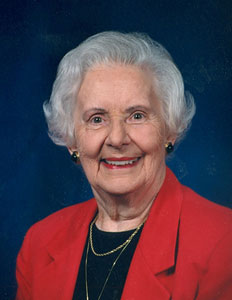
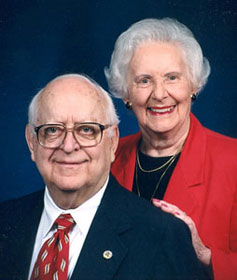
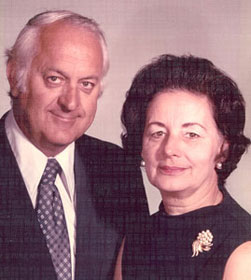
On November 16, she delivered some food to the neighbor across the street (this woman had just lost her husband to cancer). Mom fell (no one is sure why) and hit her head on the concrete steps. My dad and brother took her to the hospital (she would never return home). There was a slight concussion. More seriously, there was bleeding in her brain from the trauma. To minimize the bleeding, she was taken off blood thinners. This allowed some previous hardened blood from around her heart to dislodge and move towards her brain. This caused another stroke. She was in the hospital for almost 5 weeks, in and out of Intensive Care, and in and out of physical and speech therapy. She lost movement on the right side of her body and contracted pneumonia. She had trouble breathing. In ICU she was on a machine to help her breathe. Mother specifically requested that she not be kept alive by any mechanical efforts. On Wensday morning, December 18, my Dad, two brothers, and I agreed to remove the breathing tube. It was. She lasted for about 22 more hours, taking her last breath the next morning, December 19, 2002
A Memorial Service was held on Sunday, December 22, at Preston Hollow Presbyterian Church in Dallas. Our family joined this church in 1952 and we all had been very active in church activities. There were about 3-400 people present for the service. The pastor did a superb job. Mom had provided some specific notes on hymns, Bible passages, and thoughts to share. There was a reception afterwards with many people offering wonderful memories and heartfelt condolences.
A few weeks earlier, Mom and Dad had bought several niches in the church's Columbarium - a courtyard where cremains are inurned (pic below left). We all felt this was more appropriate than being buried in a plot. Mom would be in the family church, blocks from the family home. The Inurnment service was held Tuesday, December 24, at 11a. Now when I visit Dallas, I often 'visit' mom at the Columbarium upon arrival and I say goodbye to her before heading back to Oklahoma. I sit and share with her what is going on in my life.
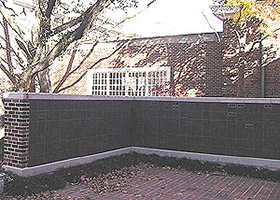
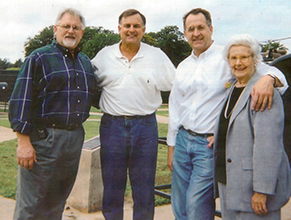
Final memories
• The last time I saw Mom out of the hospital was when the entire family came to Edmond for the grand opening of the new office for the Department of Design (mid-October, a month before she entered the hospital). Mom was instrumental in getting the office built as she and Dad donated most of the money for its construction and furnishing. It was named in their honor: The James W. & Lorraine R. Watson Department of Design Office.
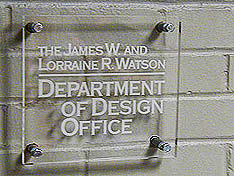
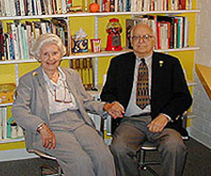
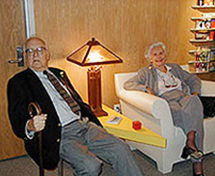
• We had a great weekend. After the office opening on Friday evening I, my brother, and my Mom went to the UCO Choreographers Showcase dance concert and we went backstage so Mom could meet the UCO dance faculty and talk 'shop'. On Saturday, we toured the campus, the 45th Infantry Museum (picture of her with her 3 sons), the Oklahoma City Memorial, and had dinner together. Sunday morning we hugged and said our goodbyes at their hotel in Edmond. It would be the last time I saw her out of the hospital and the last time to hug her.
• My other fond final memory was a few weeks later during Thanksgiving. She was out of IC (for the time being) and I asked the nurses to help her into a wheelchair. I took her for a ride - down the hall, in the elevator, and outside to enjoy some fresh air and sky. While she couldn't speak much, she smiled and nodded her pleasure. This was the first time she had experienced 'freedom' since November 16. We both enjoyed our ride. It would be the last time she was outside.
• The day before she died, I was alone with her in her IC room. She squeezed my hand tightly and tried to raise her head. I believe she was trying to talk to me - to tell me that she loved me and was proud of me and that she wanted me to continue on doing good work.
• There are certainly many other fond memories. Many family summer trips all across the country, Cub Scouts and Boy Scouts (she was a Den mother), family reunions, Christmases, birthdays, visits home from college, and support of my work at school. She traveled all over the world. Mom had a tremendous zest for life, actively involved - a participant, not a bystander. A true role model and mentor.
A few regrets
I regret I didn't spend more time with her at the hospital, especially towards the end. While people, especially my dad, stopped in to visit she was often alone in that strange environment. She spent her last night alone and took her last breath with no family members present. That still bothers me. Other than that, I have very few regrets. I expressed my love and appreciation. She had a full and wonderful life - somewhat trying at times as she raised three boys into successful men. Experiencing the death of a loved one (not to mention my dog Austin; Conor, a student; and my dad) helps us put things of life into better perspective. I will strive to take better care of myself and appreciate life, time, health, opportunities, friends, and family.
What I wrote for her Memorial Service
The day before Mom died, I stroked her head & held her hand.
I told her I loved her very much and I wanted to thank her.
But I couldn't: there aren't enough words, there isn't enough
time, there aren't enough emotions.
How could I thank the person that sacrificed so much,
loved so much, cared so much, and taught so much?
I couldn't.
I will express my thanks by how I live my life: I will be more
compassionate, be more active, be a better leader, get more
involved, and be a better teacher. I will continue to inspire
and motivate young people to grow & become better thinkers.
Mom will guide me and help me. She will forever be with me.
A favorite passage of Mom's Read at the Memorial Service
When I come to the end of the road
and the sun has set for me,
I want no rites in a gloom filled room,
why cry for a soul set free?
Miss me a little - but not too long,
and not with your head bowed low.
Remember the love that was once shared,
Miss me - but let me go.
For this is a journey we all must take,
and each must go alone.
It's all a part of the Master's plan,
a step on the road to home.
When you are lonely and sick of heart
go to the friends we know,
And bury your sorrows in doing good deeds -
Miss me - but let me go.
What Mom wrote to the family Read at the Memorial Service
Celebrate Life!
I have had an active, satisfying & fun 'good life'. God has been good to me - why?
I don't know except that I led my life like my parents taught me - in their training,
examples, discipline, & faith.
I had my first ballet lesson at the age of 7 & have loved it & all that goes with it
all my life - a lot of hard work, physically & mentally, the discipline, the dedication,
and the beauty.
My great love was my family; a wonderful understanding husband.
I dearly love, respect, & have great pride in 3 sons, Bill, Steve, & Jim;
daughters-in-law Sandy & Debbie; and grandchildren Allison, Eric, Jimmy, & Tracy.

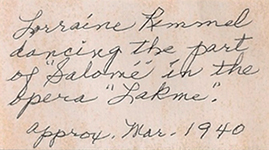
Excerpts from an article in the Dallas Morning News December 22 2002
Promoted ballet, folkloric dancing
Lorraine Remmel Watson, 83, who taught and promoted ballet in the Dallas area, died Thursday, December 19, 2002, at Presbyterian Hospital in Dallas of complications from a fall.
A woman who was devoted to her family, Mrs. Watson taught dance rather than pursue a career as a professional dancer so she could take care of her family, said her husband, James W. Watson of Dallas.
Mrs. Watson was born November 9, 1919, in Madison, Wisconsin. She took ballet lessons at an early age and studied ballet for a year in Chicago. She studied dance at the University of Wisconsin before getting married. Upon arriving in Dallas in the early 1950s, Mrs. Watson taught ballet at several studios, schools and organizations. She was a supporter of the former Dallas Ballet and served as the Company Manager and Administrator. She was a member of the Dallas Dance Council.
She joined the Pan American Round Table in 1954, a group that fosters relationships among people of the Western Hemisphere. At the time of her death, she was serving for a third time as Director of a Dallas table. In 1964 she founded and directed a Pan American Folkloric Dance Group which performed at PART meetings in Corsicana, Tulsa, and schools and organizations in DFW.
In addition to her husband, Mrs. Watson is survived by sons William Remmel Watson of Garland, Stephen Bruce Watson of Dallas and Professor James Robert Watson of Edmond, Oklahoma; two daughters-in-law; and four grandchildren.
The Lorraine Remmel Watson Dance Scholarship
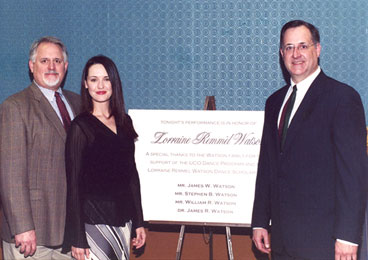
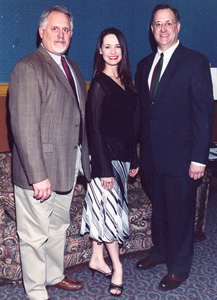
Above: Brother Bill, niece Allison, and Jim at the presentation of the first scholarship
Lorraine Watson loved and lived dance. She was a dancer, a teacher, choreographer, administrator, and ardent supporter of all that is dance.
• The last dance performance she saw before her death was the UCO Choreographers Showcase.
• The last dance professionals with whom she talked 'shop' were the UCO dance faculty.
• Her son, Jim, was Chairman of the Department of Design at UCO.
• Lorraine and her husband, James W, are donors to the Department of Design.
In recognition of these facts and in honor of her love for dance, her son, Dr. Jim Watson, established the Lorraine Remmel Watson Dance Scholarship to be awarded to deserving dance majors at the University of Central Oklahoma. It has been endowed for perpetuity by Jim and the Watson family. Lorraine Remmel Watson Dance Scholarship recipient criteria
1. Must have a declared major of Dance in the Department of Dance at UCO.
2. May be of any classification, but must be enrolled in at least 9 hours for the semester in which the scholarship is awarded.
3. Must meet other qualifications as determined by the Dance Department Director, including a passion and commitment to the study of dance as a fitting tribute to Lorraine Watson's own love and dedication to dance.
Lorraine Ruth Remmel
1919: Born in Madison, Wisconsin on November 9. Studied ballet from the age of 7 through high school. The day after graduation from West High, her parents and Jim Watson took her to Chicago for the summer professional tour.
1937-38: Chicago, studied ballet, character, and a little tap. She took 4/5 classes a day, 5 days a week, and 3 on Saturday; assisted with a children's class. For 3 summers she was on professional tour. She majored in dance at UW and taught at her own studio, the Lorraine Remmel School of Ballet in Madison. She taught ballet and tap in LaCrosse for 3 years, with her last recital in 1942, one week before her wedding.
1946-47: Taught in Maplewood, Louisiana. Dallas: taught ballet at the East Dallas YMCA.
She joined the Dallas Civic Ballet Society, and was Company Manager from 1963-73.
1963: Choreographed and performed Suite de Mexico at the Southwest Regional Ballet Festival in Ft Worth.
1968-71: Taught at the Steve Quirk Studio.
1969: Helped with Firebird for George Skibine. Guest speaker, Women's Club: “100 years of dance in the US.”
1971: Administrator and a founder of the Dallas Civic Ballet Academy (Dallas Civic Ballet started in 1957).
1954: Joined the Pan American Round Table III of Dallas. Chairman, Director 1961-62 and 1975-77, taught Mexican-American children at Ann's School in Ballet, Chairman of Navidad y Caridad, hosted foreign visitors, guest speaker on the Pan American Round table organization, Chairman of the Exchange Library from 1961-63, Editor and Publication Chairman of Panamericana Texana 1963-67, Member of Board of Trustees for the Florence Terry Griswold Scholarship, directed a seminar and workshop in Waco for the North Texas members, member of the Nominating Committee and the Protocol Committee 1985-87, and attended State Conventions starting in 1961. 1966-68, Zone 1 Director for the Alliance of Pan American Round Tables. She attended conventions for the Alliance of Pan American Round tables starting in 1962. Attended the 75th Anniversary of the Pan American Round table movement in San Antonio.
1963-81: Founder and Director of Pan American Folkloric Dance Group that performed at 32 schools, several country clubs, SMU, El Fenix, Union Station, hospitals, churches, hotels, State Fair, and others.
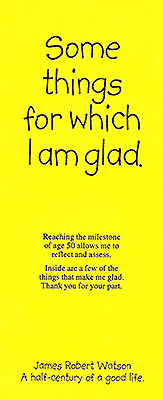
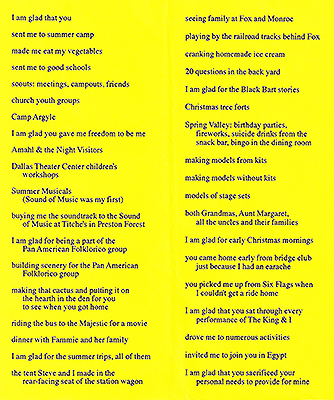
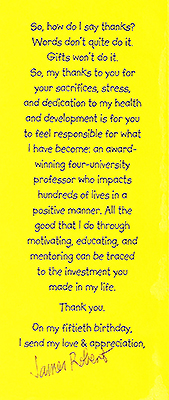
• Mom died in December, 2002. Christmas was a bit tough. Inurnment service was on Christmas Eve. The focus of Christmas was to keep dad occupied. We spent time at each brother's house. Everyone did the best they could to not dwell on the huge void in the family, at the dinner table, around the tree.
• I spent many spring weekends in Dallas to spend time with dad who now lived alone after 60 years of marriage. One weekend I took him to see Alegria by Cirque du Soleil. I enjoy their work and wanted dad to see this show with me. We had a great evening.
• In April, 2003, 4 months after mom died, dad had a severe stroke. We moved him into rehab and critical care nursing homes. He never went home again. I spent many weekends throughout the spring, summer, and fall driving to Dallas and taking care of dad. Helping him eat, wheelchair rides, crossword puzzles, and talking and sharing.
• We went through decades of mementos in our family home, held an estate sale, and sold the house in September. We had moved into this house in 1958.
• Dad got progressively worse until late September when he was taken back to ICU. He was put on a breathing machine (which he specifically did not want). My brothers kept him on the machine until I could get back to Dallas to be with them when dad took his last breath.
• Dad died on September 29, 2003.
• Christmas was always a great family time filled with the decorations, aromas, foods, and good times of the holiday. My mother was great at decorating the house, cooking our favorite meals, and having a warm welcoming house for friends and family. I have many fond memories of the Christmas season at the Watson house. Mother even baked a birthday cake for Jesus and had us sing Happy Birthday. However, once my parents died in 2003, there was no way to recreate those traditions so I began some new ones in my second hometown of New York City. Christmas now is quite different, but still memorable. I have a playlist of carols on my iPod, I have a couple of decorative trees for the apartment, and the big city is just glorious at Christmas - the lights, sounds, and holiday activities. Of course, its also crammed full of tourists.
James W. Watson, September 29, 2003
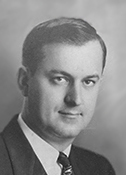

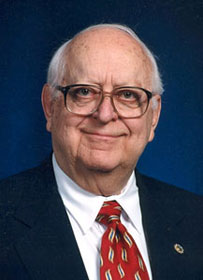
He had gone into the hospital on Friday, April 4, 2003, for an outpatient check on his kidneys. He was expecting to go home that evening; he had made plans for the weekend. He never went back home again. A few days later, on Tuesday night or Wensday morning, April 9, he suffered a severe stroke that would progress to the point of paralyzing his left side and ruining his short term memory. He was discharged from the hospital and my brothers moved him into a rehab center for about 8 weeks. He did not improve. We then moved him into a critical care nursing home in North Dallas. That became his last place of residence.
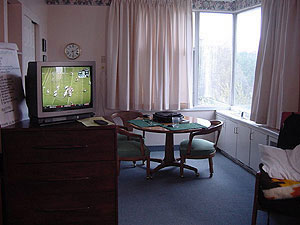
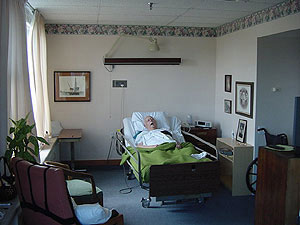
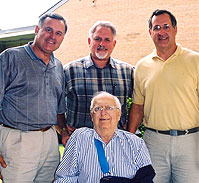
He became weaker and less coherent. He was taken to ICU on Sunday, September 28. He was placed on a breathing machine. He and mother were explicit in their instructions that they did not want to be kept alive by machine. My brothers and I agreed to remove the machine. The breathing mask was removed about 4pm on Monday, September 29. He held on for 7 more hours. We had conversations - he even cracked a joke or two. He gradually became quieter and more still. His breathing slowed until he took his last breath at 11:13pm. With him that evening were his three sons, daughters-in-law, and grandchildren. He died on September 29, 2003, due to complications from a stroke. His best friend of 70 years and wife of 60 years had passed away on December 19, 2002, less than four months before his stroke. He had never quite gotten over her untimely death.
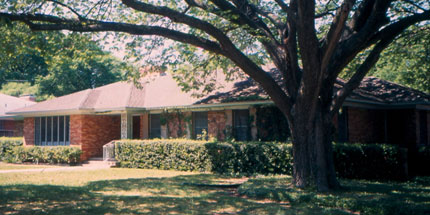
My brothers and I decided to sell his car during the summer and to sell our family home. We knew Dad would never go home again.
An estate sale was held on September 6 & 7. The house that we moved into in 1958 and in which my parents raised their three sons was sold on September 15, 2003.
My last visit to the house was Friday morning, September 26. The new owner/builder had his signs in the yard and there were 'No Trespassing' signs on the doors. The house was razed during December, 2003, to make way for a new larger house.
Final memories
• Taking him to see Alegria, Cirque du Soleil in Febuary, 2003. I wanted him to see Cirque that I have enjoyed so much. It reminded him of the circuses he saw in Europe - the music and the single ring. Although it was a bit tiring for him, we had a fun evening, just the two of us.
• Crossword puzzles: we would read the clues and Watson would supply the word. Sometimes we helped him along. He really looked forward to the puzzles. By September, he was no longer able to concentrate long enough to do any more puzzles.
• Breakfasts at Panera Bread and dinners at Buca de Bepo Italian restaurant during the summer. These were next to the rehab nursing home near NorthPark mall. We would get him into his wheelchair and wheel him across the street to the restaurants. He enjoyed getting out and being with his sons.
• Sitting by his bed, holding his hand and talking with him.
• Final wheelchair ride on Thursday, September 25. He hadn't been out of bed for weeks. The nurses were so pleased to see him out of the room. We went and sat outside in the fresh air. It would be his last breath of outside air.
Final conversations
The Thursday before he died on Monday, I visited him at Presbyterian Village. I did not want to leave him as I knew he would soon be gone forever (I do not believe I will see him in heaven.) I could have stayed with one of my brothers that night but I chose to sleep right there in his room - on the floor. It was uncomfortable but it felt good to be there. I wanted to stay with him as long as I could. I believed we would not
have much more time together (he died 3 days later). And, even though I had violated the Village's overnight procedures, a couple of the attending nurses brought in a stack of blankets and pillows so we could make a more comfortable floor bed.
He was not very responsive and he was hallucinating a lot. This conversation was during the night:
Dad: Jim, I'm ready to go. (He was probly just thinking about
going somewhere in the car, but it startled me a bit.)
Jim: Whenever you're ready, you can go, its okay.
This conversation was the next afternoon
Jim: Watson, I'm going to go back to Oklahoma.
Dad: Have you got everything you need?
Jim: Yes. Thank you for all you've done
(for giving me everything I need).
Dad: Oh, thank you, Jim, for all your help.
Call me when you get home.
Jim: I'll call you.
Dad: Come see me soon.
Jim: I will. I love you. Bye, Watson.
When I left his room, I spent a few minutes in the lounge outside his room to regain my composure. I truly felt this would be the last time I would see him alive. I went back into the room to take one more look at my father. I whispered my love and thanks and said goodbye one last time.
I then walked out and quietly drove home to Oklahoma.
The next morning I wrote my brothers and told them that I felt it was time to let dad go. He deserved better than to live this way. Mom is gone, the house is gone, and, for all practical purposes, dad is gone, too.
On Monday morning, September 29, I got a phone call from my brother telling me to get back to Dallas as soon as I could. I flew back to Dallas to be with him when he took his last breath. At one time during his last hours, I was alone with him and we had our last talk. I again thanked him for his sacrifices and his love. I told him that I would always love him and always remember him. He squeezed one of my hands, kissed the other one that was stroking his head, and whispered, We love you.
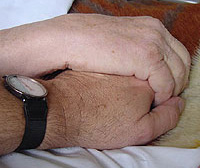
There have been many times when I wish I could see him again or talk to him. I can't. Never again. But I am so glad I slept on the floor. That simple act gave me the satisfaction that I had done about all I could do to maximize our time together. It gives me joy that I treated him well and with the respect and love that he deserved. He had made many sacrifices so that I might have a better life. Much of what I am or have achieved is due to his influence.
Some of what I have learned by witnessing people close to me die:
• The fragility and uncertainty of life
• The need to rearrange priorities and adapt to circumstances beyond our control
• The need to appreciate health and life
• The desire to enjoy and cherish time with loved ones
Memorial service
There was a memorial service at Preston Hollow Presbyterian Church on Saturday, October 4th. Our family had joined this church in 1952 and dad had been very active; 20 years singing in the choir, Christmas pageants, theatrical productions, emeritus group, youth groups, and the voice of the church as announcer for the radio broadcasts of the Sunday services. There was a large crowd. A couple of family friends spoke eloquently and adoringly about dad (see below) and the minister read statements from each of us sons.
The inurnment with the family was immediately before the service in the Columbarium courtyard near the sanctuary (pic above). Dad's cremains were put into the same niche where mom's were placed on December 24, 2002. Each son placed two photographs into the niche, to be with them forever.
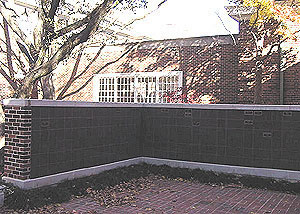
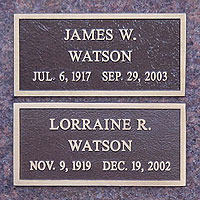
Calendar of events
• Friday, April 4, 2003: Admitted to hospital for an outpatient check on his kidneys. He was expecting to go home that evening; he had made plans for the weekend. He never went back home again. A few days later, on Tuesday night or Wensday morning, April 9, he suffered a severe stroke that would progress to the point of paralyzing his left side and ruining his short term memory. He was discharged from the hospital and my brothers moved him into a rehab center for about 8 weeks. He did not improve. We then moved him into a critical care nursing home in North Dallas. That became his last place of residence.
• Sunday April 6: Phone call about Dad in hospital since Friday. Breathing concerns.
• Monday April 7: Called Dad late afternoon. Good talk.
• Wensday April 9 9:10: Bill called - Dad had a stroke Tuesday pm/Wensday am. Took walk - decided I had to go home. Wrote emails with instructions for Linda, classes, AIGA.
9:30: Went home, packed, sat outside in rocker. Loaded car and dogs.
10:40: Drove to Dallas. Tough drive, napped in grass at McDonald's.
3:00: Got to hospital, 6th floor.
Took dogs to Orchid Lane, back to hospital until 11:30.
• Thursday April 10: Talk to Mom. Preston Center Starbucks.
10:15-3:15: Dad moved to room 305.
Home to walk dogs, watch game shows.
5:15-9:15: Hospital visits.
• Friday April 11: Hospital, lobby coffee.
Saw Dr. Whittaker (also Mom's doctor). Talked with social worker. Lunch with Bill & Steve. Toured Presbyterian Village North. Discussed strong possibility that Dad wouldn't go home to Orchid Lane - may go straight to PVN.
2:15-3:00: Hospital, lobby coffee; home, clean refrigerator. Drive to Abrams PetSmart, dogs to White Rock Dog Park. Orchid Lane: Look at files with Steve.
6:00-10:00: Hospital, Bill, Steve & Sandy til 7:30.
• Saturday April 12: Walk Dallas.
9:00-11:30: Hospital.
Lunch at Central Market, drive Coit to High 5; Let dogs out, pack.
1:00-3:15 Hospital, talk with Steve.
Home, phone messages, load car. Say goodbye to Mom, drive to Edmond. Love's, gas, coffee, walk dogs.
7:30: Home, unpack, laundry, mail.
Some emails
Sent between April and October, 2003.
From: Jim Watson
To: Design faculty, College Dean
9:30am Wensday
My dad suffered a stroke this morning so I'm leaving for Dallas. One of my regrets with my mother's death is that I did not get to the hospital soon enough. I don't want that to happen again.
I need help:
Linda or Larry:
1. Go to Wensday 10am class, Graphic Design I, and collect the ambigram projects that are due today. Tell them no class today - turn in work and go. We should have class on Monday. Put projects on my desk - I will leave the office open (please lock it tonight).
2. Go to 2pm class, History of Graphic Design, Comm Building Auditorium room 120, and tell them no class today - move schedule back 1 week - Lecture 9 will be next Wensday.
3. Linda - you have a meeting today at 2.
Larry,
1. I left the AIGA office slides and handouts with Linda. The program Thursday starts at 7:30 - maybe check in around 7pm. At MetroTech off MLK, between 36th & 50th - in the conference center. There's a map at http://www.metrotech.org Thanks.
2. ClockTower has a presentation to the Global Education Fund Thursday at 2pm. They are fine with that - ready to go. Please let them know I won't be there.
3. They have another presentation at 4pm for Spitfire Grill with Craig from Music. Not sure where they are with that - please check in with them and see if they need help. They are showing a tight rough or finished comp - depending on how far they've gotten.
There may be more details I'm forgetting. Everything else can probably wait - Tuition waivers, award nominees, MFA stuff.
Thanks for your help. Jim
How am I doing? Thanks for asking/caring - here's an update: I have accepted (or in the process of) that my dad is just waiting to die. My brothers and I had a meeting Monday with the nurses and rehabists - they all pretty much agree he is not trying too hard to overcome the affects of the stroke. They also informed us the stroke did more damage than we originally thought. They feel within 2 weeks he will stop making progress. When that happens, Medicare will stop paying for rehab and we will move him to another facility and pay for the nursing and rehab. He is clinically depressed about losing his best friend of 70 years and a spouse/partner of 60 years. He doesn't want to do anything - seems he has just has given up with options for life. Its hard to see my father who was a strong figure in my life become so helpless. I replace his diaper, clean up his shit, hold his dick while he pees into a urinal - stuff that, while I wasn't mentally prepared to do, I do because he needs me to.
Friday night I stayed in a hotel because it is too depressing to be in the house. We moved there when I was 8 years old so it is full of wonderful memories and most of those include my mother. He has not moved any of her things and so there are too many reminders all around the house. We took him to the house on Sunday to begin deciding what to sell, keep, etc. It feels better being in the house now because I am throwing things away and we are getting it ready to sell. The Sunday tour of the house with dad gave us the green light to clear it out (but there's 45 years of stuff) - we did not want to move anything until he had a chance to go through the house one last time. It was a bit strange for him but he knows he will never live there again (and he went to the hospital in April for some 'routine' stuff thinking he'd be back home that night).
I will go back a week from this Friday to be with him, help my brothers, and do more work on the house and its contents.
Bottom line -
1. There are tough times ahead.
2. I learned I am still grieving my mother's death.
3. I will go back on antidepressants when I go back to Dallas (or tomorrow).
4. I will go back to therapy if necessary.
5. I am assessing me and sometimes, I don't like what I find.
6. I will help my brothers settle the estate.
7. I have a new respect and patience for old people.
8. I will take better care of my mind and body.
9. My dog, Conor, mom and now, dad - I've had enough loss and death stress for a while.
10. I will always miss my mom (and dad).
11. I will move on, day by day, or minute by minute.
12. Life is good.
Chris, I apologize if my crying in your office made you uncomfortable. I hope it didn't. My mind is sort of messed up. I have no regrets about choosing to be single. My parents were my confidants. I called home at least once a week - every Sunday. I called them with news and when I was faced with decisions. They shared my accomplishments, advised me, and comforted me. That is gone and I miss it. My dad is unable to answer the phone. My parents were always together - I never even saw them fight. Wonderful childhood. When my mother died, the parental unit was gone. I enjoyed my visits this spring with dad and even now - we have talked and bonded a lot. Anyway, I really appreciate your patience with me, your listening, and caring. I know this will all pass. Most moments I am doing great - but there are those waves of loss, Loneliness, finality, etc. that overtake me. I hope you're okay with me unloading heavy stuff on you. Thank you. I also apologize for all those times when I've been a jerk. I'm so sorry. I really am working on it. I'm learning how short and sweet life is.
Okay, I took a break. New topic: I need to get with you soon concerning (here come the bullets):
• Fee forms and procedures - we used to get slides developed at ProPhoto. We would send them a PO for a couple hundred dollars and they would deduct each time we brought film in - lets discuss some options.
• FIDER update - sorry I dropped the museum request on you today. There was a miscommunication or something somewhere but I will take the blame - we should have asked you sooner. If I can work with Bob and Joe on space, let me know. The museum would be ideal for the site visitors to review student work - wall space, near the design office, near the conference room for meetings, and right off the design gallery. We would like to start collecting student work next week and the site team leaves on Tuesday, October 21.
• MFA proposals and update
• Office space for Ruki and hopefully, new full time faculty in fall.
The drive tomorrow will be therapeutic. I'll check in with you next week. Thanks for all the time, energy, and support you provide. Please know that you are appreciated, loved, and respected. Jim
Chris, re email from Torrie: Monday, October 13 is fine with me. I would like Melinda to join us and she has penciled it into her calendar. If its okay with you, let me know & I'll respond to Torrie. Thanks.
PS: Sure enough, the weekend was a roller coaster - up (or at least sorta up and then down, way down. Last night was awful - I got very little sleep (awkward - when I'm sleep deprived, I cry even more easily). We think he's had another stroke as his speech is now almost incomprehensible, his concentration is poor, and he has no strength in his legs. My brothers are calling his doctor today. Letting go and saying goodbye to the house, its furniture, and contents is very hard. We have to be out of the house this Sunday night - the estate sale people take over for the sale the next weekend; we close on the house the following weekend; the bulldozer will probably come in soon afterwards.
As always - this will be moment by moment - I will need to rely on people here to be patient and understanding, as you always are.
Thank you. I may go to Dallas this Thursday instead of Friday - we'll see. Jim
Well, I didn't think it could get much worse but this past weekend was the worst. Dad is weaker, not eating, hallucinating constantly, and unable to answer our questions. It was very hard to leave him on Sunday afternoon. He told me he was proud of me. Also, childhood home was sold at noon today. I walked through it yesterday and saw it empty for the first and last time. We moved into it when I was 8 years old - numerous Christmases, birthdays, etc. I saw the corner where my desk was on which I did high school homework and built model cars. It was a tough weekend.
I'm about to go home now (around 3pm). I'm sorta bummed still. The heads up is that, unless I hear from my brothers that he is improving, I will go to Dallas after class on Wensday.
What I want most is to be with him and feed him and sit by his bed and hold his hand. But I also do not want to get behind in the large lecture classes Tuesday nite and Wensday afternoon. So, I will stay to cover those and then probably go. The heads up is, if I do go, I will miss the Financial Managers meeting on Friday and probably miss deadlines for Faculty Evaluations, and Phase 1 hiring. I hope we can work those out later.
As always, thank you for your patience and understanding. Jim
I felt great on Thursday. I finally got to a point of being ready to let him go. I have been holding on, more for my sake. That is selfish. I need to let him go. This realization has been very liberating. I feel somewhat freed up. I will certainly be impacted when he does go, but I'm better prepared. I have no regrets - before I leave his bed to return to OK, I always tell him I love him and I thank him for his sacrifices and support. His active fruitful life is already over.
I had a good talk with the nurse Wensday night - his doctor has altered his medication - he is stabilizing and doing better (not good, but better). As of now, I am not planning to go to Dallas until next Thursday. I have lots to do here at home to get caught up and I need to grade 100 tests. I feel pretty good about this. I plan to call the nurse each evening this weekend to see how his day went. Of course, if he slips, I will get in the car and go.
Purpose of this email: although I will be in town, I need a day away from UCO, so, I'm not planning to be in at all on Friday nor attend the meeting Friday afternoon. Linda will be there. I often remind myself of your advice - that I need to take care of myself, also. I will try to do that. Thanks.
My father was taken to ICU Sunday. His toes and fingers were blue. He is on a breathing machine. The doctors say he will live for about an hour after we take him off the machine. He and my mother were both explicit in their desire to not be kept alive by machine. My brothers are waiting on me to get to the hospital. I would like to be there when he takes his last breath. I am going to the airport now.
I plan to be gone all week. Any departmental business - please work with Linda and Larry.
Lon, can you give me an extension on the October 1 deadline for course changes - ours are only prerequisite changes - not too serious.
Larry, please check in with ClockTower periodically. They are working on a logo for the College of Business. Today, Monday, they have a meeting with Brennan Michaels at 1pm.
Linda/Larry, please tell my History class: no class on Wensday - Comm Auditorium, 120, 2pm.
Melinda, get with Linda/Laci/Larry for any FIDER needs.
I can be reached at brother Bill's cell: xxx-xxx-xxxx
Thanks.
My father passed away Monday night at 11:13.
His three sons, daughters-in-law and grandkids were with him. We removed the breathing mask about 4pm and he held on for 7 more hours. We had some good talks with him - he even cracked a joke or two. He gradually became quieter and more still. He died very peacefully. I had some good alone time with him (good? I was so sad I couldn't cry hard enough but I am glad I had the opportunity to thank him one last time for his sacrifices, time, and love).
I didn't sleep last night and am sorta numb today. We will meet with the funeral home, the church, plan the service, and go remove his/our furniture and clothes from the nursing home. I will email/call Linda when we know the details on the Memorial Service.
I am glad I work with wonderful people and can spend this time with my family.
Thank you for your patience. Jim
From: Department Secretary
The memorial service for Jim's father, James W. Watson, will be at 10:00am on Saturday, October 4th, at Preston Hollow Presbyterian Church, 9800 Preston Road, Dallas, Texas. A reception following the memorial service will be at 11:00am in the church reception hall. Flowers are not allowed in the sanctuary, but will be arranged in the reception hall.
We got a lot done today. I took a sleeping pill at about 8pm. Hope it helps. It was very hard removing his things from the nursing home. That had been his home (and my weekend home) for the last 3 months. The nurses came in to hug us, some were crying, and to tell us how much they liked dad. I plan to take a floral arrangement by there on Friday for the nurses' desk. They were all really good with us and dad. We removed the last of dad's belongings - his glasses, shoes, clothes, wheelchair.
I am flying back to OK late Wensday afternoon. I don't plan to come to the office on Thursday. I am not yet strong enough and I'm pretty sure if someone mentions my dad, I'm likely to become a blubbering idiot. I may sneak in at nite to check email and get next week organized. I will drive back to Dallas with my funeral clothes and return to OK on Sunday afternoon. Lon, you do not need to feed the dogs on Thursday - I will do that - but please check on them Saturday. Thanks.
Dad's obituary will be in both Wensday and Thursday's The Dallas Morning News, Metropolitan section.
Lon, lets meet Monday or Tuesday about curriculum changes. Thanks.
Details for the Memorial Service:
Saturday, October 4, 2003
Preston Hollow Presbyterian Church, Dallas
Inurnment (putting cremains in niche at church, family only): 10:30am
Memorial Service, Sanctuary: 11:00am
Reception, Jubilee Hall: 11:45-12:30
I have my father's story on my website: https://www.jamesrobertwatson.com
I am mostly okay, with a few periodic bouts of grief (I've lost a lot in the last 10 months). I really feel fortunate to work with such good people. The week away and with the family was very therapeutic.
Thank you for your thoughts and prayers. I will be back at work on Monday, the 6th.
Jim
Dear Dr. Watson
I have tried many times to write you a note about your father's death, but words always lost their ways. I thought talking might be easier for me but things are quite bad in Pakistan when it comes to communication.
Although I don't know much about your father, I find it difficult to accept his death. It is because of you. I made a connection with him through you, a connection of love and affection. Your love for me is the reflection of his love for you. I know how hard it is to remember your parents when they are not around. Just remember them.
I am sorry but I can not write more because I don't know what else to write. The only thing I can say is I love you and miss you very much. I told Maria about your dad and mom. She became very sad.
Please take care of yourself. I need you and many more Abdullah needs you. Please never stop teaching and never stop loving the way your parents loved you.
Abdullah
The message that came to Early Birds Men's Breakfast wasn't "completely unexpected", but, it drew a startled and audible gasp. Jim's family should know that the forty men at the breakfast last Tuesday stood as one, in prayer and in tribute to Jim Watson. A favorite story about Jim is that he was a confidant and recurrent house guest of J. Paul Getty. If ever there was a tribute to an oil man's professional skill and his personal discipline and integrity, this would be it. For more than 20 years, Jim was the trusted friend of the world's most famous oil man, a man who trusted few men.
A brief bio of James W. Watson
From information by Steve Watson and Joe Josephson
• James Webster Watson traveled around the world 66 times "from the Yakutsk to the Strait of Magellan; from the Outback to the Middle East to India; from the jungles of Brazil to the top of the world to the Sahara desert." He traveled in 76 countries, flew over 900 flights on 52 airlines, and traveled about 2 million miles - the equivalent of about 80 trips around the world or over 3 round trips to the moon.
• Jim Watson was born July 6, 1917 in Madison, Wisconsin. His parents were James W Watson, a Professor of Electrical Engineering at UW, originally from LaCrosse Wisconsin and Ethel Churchill Watson, a Professor of Electrical Engineering at UW, originally from Monroe Wisconsin. They were graduates of the University of Wisconsin, his grandmother graduated from UW in 1881, and his great great aunt was in the first class for women in 1864. During the great depression his father's salary was reduced and the income from her piano class went a long way towards giving me and my brothers a close to normal life during those trying times.
• Jim played a few sports in high school, but his real love was music. From 1935 to 1939 he played saxophone, clarinet, and oboe in the Madison Civic Symphony Orchestra, the University of Wisconsin Concert Band, and several dance orchestras. He considered a professional career in music but majored in Mining and Metallurgical Engineering, graduating in 1939. He wanted to go into the mining profession, but unfortunately nobody was interviewing that year. Shell Oil Company came to campus and he interviewed with them. About a week later, he got a job offer in Houston. He joined Shell Oil Company on July 10, 1939 and spent two years in training which took him to Hobbs New Mexico, Midland Texas, Louisiana, and Arkansas. He then became a subsurface geologist for Shell throughout southern Louisiana.
• In Houma, Louisiana on May 16, 1942, Jim married Lorraine Remmel who lived at the same address, but two streets over. They had known each other since childhood, and were high school and college sweethearts. They celebrated their 60th wedding anniversary in May, 2002, 8 months before Lorraine's death on December 19, 2002. He and mother really enjoyed raising their three sons, traveling, playing bridge, and musical theater. They had season tickets to the Dallas Summer Musicals since 1952. They attended 274 musicals plus 80 other musicals in New York City, Moscow, Dublin, London, Fort Worth, Houston, Garland, and Eureka Springs.
• Jim and Lorraine had their first child, William Remmel in March of 1945. They lived in the bayous of Louisiana and had to go to Orange, Texas for Bill's delivery. The next son, Stephen Bruce, was born in Lake Charles, Louisiana, on August 26, 1947. The third son, James Robert was born on July 27, 1950, in New Orleans. All three sons were born in cities on US Highway 90 along the Gulf coast.
• In December of 1951, Jim got a call from a friend who had recently joined DeGolyer and MacNaughton in Dallas, the premier petroleum consultant firm in the world. "They pioneered the petroleum consulting business. They were the first to convince bankers that loans could be successfully made based on the oil reserves and potential of oil fields." Clients included Mobil Oil, Getty Oil, Amoco, and individuals who bought or inherited oil properties. Watson said, "Its our job, as a third party, to evaluate the oil potential of a given property. D&M is not only the largest in the world, but also the most respected." He always said it took him all of 15 seconds to respond to that call with, "Yes, I'll be there." So January 1, 1952, he joined D&M and moved to Dallas. He knew it was going to be a great job, but he wasn't quite sure what lay ahead. Two weeks later, he was asked to go to Alaska where he was initiated into the Top of the World Club and had to eat muktuk (whale blubber), which he didn't like at all. Following Alaska, he went to Saudi Arabia. He came back and told mother, "I think I am going to have an interesting and exciting career ahead of me - I think this thing's gonna take me all over." That's exactly what his job in the International Division of D&M did. That first year, he traveled 57,000 miles and took 44 flights. His work took him to all parts of the world; during his career, he went to Algeria 35 times, Spain over 30 times, Russia 5 times, every single country in South America except the Guineas, and every country in Europe. He dined with Heads of States, Government Officials, Sheiks, and became a trusted friend to John Paul Getty, who was then the world's richest man.
• Jim and Lorraine always liked South America: Argentina, Brazil, the Amazon jungle, and consulting on the first wildcatter well in Uruguay. In Mexico, he had a long-term relationship with PEMEX, the national oil company. But his favorite country was Austria. "Where else can you get into a taxi and listen to classical music?" He loved the food, the hospitality and the music throughout Austria, especially his favorite city Vienna. One of his proudest accomplishments concerned an oil field that was jointly owned by Czechoslovakia and Austria. They had a dispute over how much each country could drill. They hired Jim Watson to help negotiate and settle the disagreement. He recommended a solution that both governments accepted. In Prague Czechoslovakia, 1968, he and mother woke up one morning and looked out their window to see the Russian tanks come in as they invaded the city. They couldn't get out of there for a few days. His most exciting trip was three weeks at the Yakutsk River in Siberia. He was always fascinated by the people of Russia in the 1960s and 70s. He saw women with backbreaking jobs and very few luxury items. They had no TVs, cars, nor phones and people would drink Vodka at night to drown their sorrows. He did enjoy the culture of Russia. He saw many plays, musicals, and the ballet, and he loved Red Square, and the "step" in the changing of the guard.
• Jim Watson retired from D&M as Senior Vice President, International Division, in 1982. In 1983 he established Watson Energy Consultants, Inc. which continued to function until his death. He stayed active with bridge, writing, church activities, and travel. He and mother went on many ocean cruises. They'd select a cruise based upon cities he hadn't been to. Some of the cities that they visited were Helsinki, Leningrad, Nanjing, Karachi, Tbilisi, Nairobi, Beijing, Islamabad, five cities in central Africa, Athens, Tel Aviv - they filled out the globe with anyplace that he had not gone on his business travels.
• He was active in Boy Scouts and the PTA. At Preston Hollow Presbyterian Church he served as Elder, sang in the choir for 20 years, was active in the Emeritus Group, led the Early Birds breakfast group since 1993, and was involved in the radio broadcasts from PHPC since 1990. He was an active member of the Dallas Petroleum Club, SIPES, Dallas Geological Society, Petroleum Engineers Club, NOMADS, Dutch Treat Wildcatters and North Dallas Golden K Kiwanis Club where he served as President 1996-1997. He was also a long time member of The American Association of Petroleum Geologists, American Petroleum Institute, and the Engineers Club of Dallas. He was an Associate Fellow of the Institute of Petroleum in England.
• He was preceded in death by his wife of 60 years, Lorraine, who passed away in December, 2002, and by brothers Charles, Robert, and Richard. He is survived by sons Bill and his wife Debbie of Garland, Steve and his wife Sandy of Dallas and Professor Jim Watson of Edmond, Oklahoma; grandchildren Allison, Eric, Jimmy and Tracy; and sisters-in-law June Watson of Elm Grove, Wisconsin, and Gladys Watson of San Juan Capistrano, California.
Jim Watson and J Paul Getty (once the richest person in the world)
Written by Steve Watson, edited by Jim Watson; 2018
• Ancestor James Getty founded Gettysburg, Pennsylvania in 1785. In 1903, Jean Paul Getty's father was sent to Bartlesville, Oklahoma to settle a small claim, which he did the day after he arrived. The short time he spent in Bartlesville were enough to whet his appetite for the oil business, and soon he acquired a lease from the Osage Nation and struck oil on his first well. Soon, he had several wells and formed the Minnesota Oil Company. He sold 100 shares of the company to son Jean Paul for $5. The family moved to Beverly Hills, California, when Getty was 14. At 21, at the urging of his father, Getty went to Tulsa to look for leases as a wildcatter - now he was in the oil business. When he was 24, Getty completed his first well, and with his father, formed the Getty Oil Company.
• After Getty obtained a land deal with Saudi Arabia's King Saud, oil was discovered - in 1953 Getty became a billionaire. Getty and the Aminoil company hired DeGolyer and MacNaughton to resolve a disagreement. D&M gave the job to Jim Watson. After trips to San Francisco and New York City to talk to Amino reps and to Los Angeles to talk to Getty reps. Watson arranged a meeting with Getty. Later, Watson was in Vienna doing some work for the Austrian government. When he finished, he worked up a proposal for Getty whereby Watson would serve as Getty's advisor to his dealings in Saudi Arabia. On the way back to Dallas, Watson met with Getty at the Ritz Hotel in London and convinced him that he could benefit from an association with D&M. Getty agreed, the beginning of a relationship which lasted about 20 years. Watson had a standing invitation to stay at Getty's homes, Sutton Place outside London, Rome, and Paris whenever he was in Europe, which Watson did often.
• He was a light drinker - his favorite drink was 5 or 6 drops of rum in the bottom of a glass, which was then filled with Coca Cola. Watson enjoyed watching Bullimore, Getty's butler, bring drinks to the two of them on a tray with a glass of ice, a Coke can, and an eye dropper for putting in drops of rum, all very meticulously.
• A workaholic - one morning Watson had a 7:00a flight out of London, so at 3a, Getty wanted to understand some charts, so they spread them all over the floor and were on their hands and knees looking at these charts at 3am!
• Getty was a good friend to those whom he trusted, Watson being one of them. Getty would sometimes call D&M looking for Watson and when Watson wasn't there, someone else at D&M would take the call, “I can help you, Mr. Getty." His reply was, “No, I only talk to Jim Watson," and he would hang up the phone.
• Sutton Place was built in 1530 by Earl Richard Weston. Visitors: Henry VIII, Anne Boleyn, Queen Victoria - who received her courtiers in the Great Hall. Getty bought the house from the Duke of Sutherland in 1961 and established his office there. Stats: 805 acres of beautiful countryside, 72 rooms, a staff of 30. Bullimore was head of the staff (once worked for the Henry Fords). Watson usually stayed in the Little Oak Room. A spring morning with the windows open and the sounds of birds and church bells coming in. You are lying under the quilt and after a knock at the door, Bullimore, the butler, comes in with a complete hot breakfast and the London Times and a good cup of coffee. Watson felt that lying there partaking of all this was real luxury.
• Many times for dinner, Getty would get his private chef and would go out on one of his oil tankers for an elaborate dinner, usually filet mignon. He invited Watson who often joined him for dinner on his oil tankers. It was Getty's way to spend time with some of the people he enjoyed.
• Getty loved Cheerios, but could never get them in England. Watson's wife (my mother) would send him a box of Cheerios for Christmas, and whenever she traveled with Watson and stayed at Sutton Place, she took a box of Cheerios to him.
• At a dinner in Sutton Place, Watson's wife fed Getty's dog with food from the table.
• A pay phone was installed in the coat room at Sutton Place. This resulted from visitors or even friends calling back to the United States when they reached Sutton Place. Getty of course paid the phone bill. He said he put in the pay phone "for their convenience."
• Once in Paris - Watson stayed at Getty's apartment with Getty and his last ex-wife. The three of them were going out to dinner that night and she had dressed up nicely - her hair was just immaculate; every hair was perfectly placed. There was a light rain. Getty was too cheap to take a taxi; the restaurant was only a couple of blocks away, “Come on, we're gonna walk." So, they walked in the rain - they had to put up with her ire during the whole dinner.
• At Getty's request, Watson went into London with him one day to join Hugh Hefner and his guests for a party. Watson sat next to Ringo Starr and across the table from Stirling Moss the famed English race-car driver. There were pictures of the party in Time and Town & Country magazines. This was in the mid-1960's when Watson's son Jim was playing the drums in a band and another son Bill was into car racing. Watson got Ringo Starr to give an autograph for Jim and an autograph of Stirling Moss for Bill.
• When Getty's health was failing, Watson visited Getty at Sutton Place. 12 days later, June 6 1976, Jean Paul Getty died. Watson thought that he was probably one of the last people to see him alive.
Dallas, rescued pound dog, Saturday, March 25, 2006
Thomas Boggs, May 5, 2008
Colleague/mentor at TGI Fridays
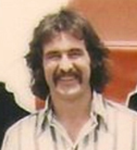
Bill Watson, September 5, 2009
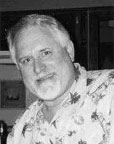
William (Bill) Remmel Watson, born March 20, 1945, passed away on September 5, 2009, after a valiant struggle with cancer of the liver. A graduate of Hillcrest High School, 1963; he attended Tarleton State College and the University of North Texas.
Bill served in the US Navy on the USS Ranger aircraft carrier as a flight deck crew leader. He served 3 tours of duty with honors in Vietnam and Southeast Asia; September 1967 - July 1971.
His passion for wine led him to spend his career with Centennial, American Wine & Importing, Robert Mondavi and Glazer Wholesale; 1974-2009.
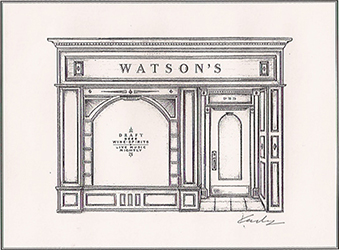
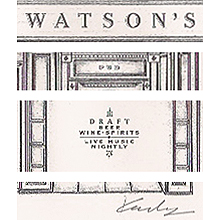
Bill always dreamed of opening his own bar. A naborhood bar like the Quiet Man on Knox Street. While going through his files and albums, we found this print of a pub called Watson's. On the window it says, Draft Beer, Wine, Spirits. Live music nightly. It is signed by Tom Curley, copyright 1998. I assume Bill had it commissioned.
Bill was preceded in death by parents, Jim and Lorraine Watson. He will be greatly missed by his wife, Debbie Watson. Children: Allison and Eric; Amy Spencer and husband, Stephen; Julie Linn; Blake Linn and wife, Ericka; Courtney Nolte and husband, Paul. He will be forever remembered as PoPo to the 5 precious grandchildren he adored.
Brothers: Steve Watson and wife Sandy, children Jimmy and Tracy; and Jim Watson.
A memorial service was held Friday, September 11, at 11:00a, in the chapel of Preston Hollow Presbyterian Church in Dallas. Memorials, in lieu of flowers, may be made, in Bill's name, to the American Cancer Society.
Bill was diagnosed with liver cancer November 2008; he had gone in to see about possible bronchitis. Doctors told him it was serious and terminal. They said he might live until August-October. He tried several options with a variety of medications and chemotherapy. Some of the medication helped, some made him feel pretty bad.
• Weekend of Febuary 6-7 2009: I drove from OK to the hospital and took him home from the hospital. I left Bill's house - he walked me to the door and said, “I love you." “I love you, too, buddy."
I drove back to OK and felt satisfied with closure - there is not much more to say or do. Just be there and help Debbie with details.
• The chemo was tough - it made him feel so poor that he decided it just wasn't worth it. He contracted with a recommended hospice care service which turned out to be a great boost, for help with medications, information, and caring. I visited him at his home in Garland, Texas, several times over the summer and especially in the final few weeks. We had some great visits. He loved talking about his days in the Navy on an aircraft carrier and his various jobs in the wine industry. He loved a good meal and a good wine.
His wife, Debbie, and their children provided great support for him. They are all loving and caring people who took care of each other in so many ways. They were a comfort to be around and share time with.
• Wensday, July 1, 2009 Debbie called to say he's getting worse. Doctors have stopped treatment. Bill sleeps all day - up for only 3 hours or so. She wishes I was there
• Each visit to his home might have been the last. But he kept hanging on, until the first week of September. On August 31, we were sitting on his patio and he started talking about his memorial service and wanting to write his obituary. I got my laptop and we set out to write a draft. He had finally accepted his own death and was willing to discuss the final acts. That was a Sunday morning. He got progressively worse that week and went into a coma on Friday night. I, from Oklahoma, and his stepson's family from Arkansas arrived Saturday about 3:00p. We each had some good alone time with him even though he was unresponsive. I was so emotionally wrought that I had to go take a walk to compose myself before going back in the house. But I ran into his neighbors and teared up again, so, shoot, now I gotta walk around the block again. At about 6:20, he simply stopped breathing. Surrounding his bed were his two children, his wife, their 4 stepchildren, a friend, and me (and lots of Kleenex). His long ordeal was over. No more pain. No more suffering. Just peace.
The service was held the next Friday morning. So many people showed up, the ushers had to bring out folding chairs and some people had to stand at the back. A cousin from Cincinnati even drove down for the service. There were 3 speakers: my brother Steve, Bill's stepdaughter Julie, and Scott O'Grady, a family friend. Very nice. There was a reception afterwards at the church and another for the family at my brother's house. Then it was over. My childhood family of five was now down to two. But I am so glad for a wonderful family, our time together, and great memories that I get to keep with me.
Memories
• One of my favorite memories was when my first greyhound, Austin, was undergoing surgery to remove a leg that was diseased by bone cancer. I was having some reservations about a three-legged dog. Bill and I talked on the phone. He said, "Jim, a three-legged dog is so you." I laughed. He was saying that if anyone could pull off walking around town with a 3-legged dog, it would be eccentric me. We laughed some more. It also made me feel proud and happy to have a unique dog. (Unfortunately, the dog died during leg-removal surgery, so it didn't matter.)
• Years ago, I was working on a logo identity for a company he was involved in - Contrade or ConTrade, I don't remember. I explored options and pursued a circle to represent the never-ending cycle that is trade. I worked out all the rationale and showed him the mark. After my presentation of why a circle is so appropriate, he simply said, "Yeah, but who will know that?" Wow, what a wake-up call. Of course he was right. It taught me a very valuable lesson about how clearly a logo must communicate its intended message to its audience.
• Other memories, too numerous to detail here, include him teaching me to play baseball and many family trips together in the car during the fifties and sixties. He was my older brother and he will always be missed.

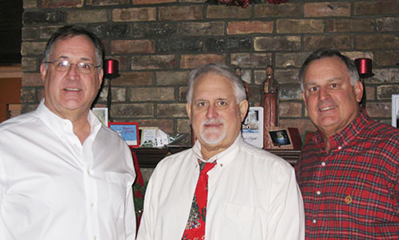
My father reading to his 3 sons while mom looked on. I am in dad's lap, Steve to the left and Bill to the right.
Bill's family
James (Jim) Webster Watson, B: July 6, 1917, Madison, Wisconsin. D: September 29, 2003, Dallas
Lorraine Remmel Watson, B: November 9, 1919, Madison, Wisconsin. D: December 19, 2002, Dallas
Steve Watson (wife Sandy, children Jimmy & Tracy)
Jim Watson
Children:
Allison (husband Randy Festner)
Eric
Stepchildren:
Amy Spencer (husband Stephen, children Mikayla & Zachary)
Courtney Nolte (husband Paul, children Pierce & Lincoln)
Julie Linn
Blake Linn (wife Lauren, children Dayton, Caden, Blakeley, Taeghan, & Baylor)
Vegas, rescued Greyhound, Friday, July 16, 2010
Mike Roland, June 16, 2015
Nabor on 4th St, 'Mayor' of our block.
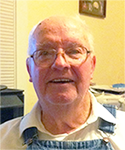
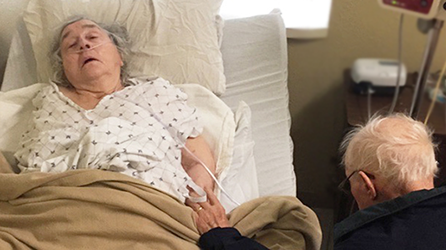
Margaret Hudson, April 2, 2016
Born September 21, 1932 in New Orleans. Died on April 2, 2016 in Dallas from complications of dementia. Ms Hudson was active, strong, and lived honestly, by her own rules. Survived by her beloved partner Liz Trice.
Ms Hudson graduated from high school in New Orleans in 1950 and from SMU in 1954, where she was a member of Delta Gamma and editor of the yearbook, Rotunda. She was a compassionate teacher of art for over 35 years and received the Ross Perot award for most outstanding art teacher and the Margaret McDermott award for AP Art History.
I attended Hillcrest High School in Dallas from 1966 to 1968. I took art classes from Ms. Margaret Hudson who graduated with a degree in Advertising Art. She introduced graphic design projects into the art curriculum - unusual for high school art - and significant in introducing me to design. I designed many stage sets and served as President of the Art Service Club. Those high school years were lots of fun and a great experience.
Ms. Hudson was a major influence on my life and career - a true role model. She impacted my teaching philosophy, as evidenced by her suggestions: Think and contemplate. Have a reason for everything. Be critical. She mentored me with a sense of humor, high expectations for my work, and subtle encouragement and support. She was a demanding teacher who wouldn't allow mediocrity from her good students.


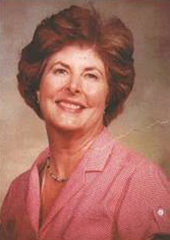
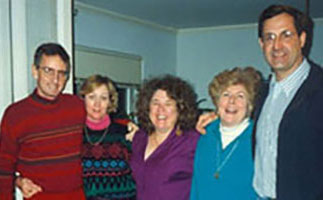
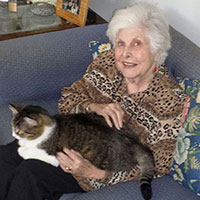
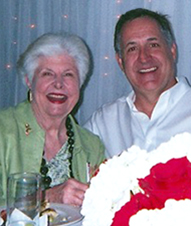
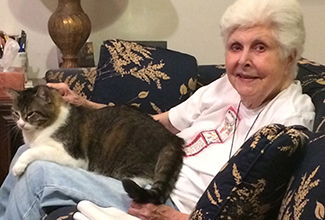

Jill Scott, January 3, 2017
Truly decent, wise, hostess, neighbor.
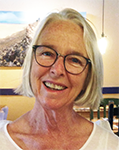
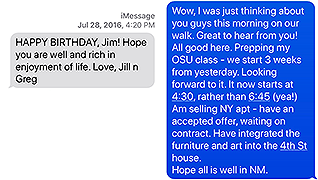
Manhattan, rerscued greyhound, Monday, January 16, 2017
Fammie Preston, Febuary 11, 2021
Close family friend, sat with family at parent's funerals, stay with us when parents traveled (we ate soulfood). I called Bill a 'nigger' and a crying apology, visiting James & spending the night playing on Canal Street, mom and I visiting her in her home.
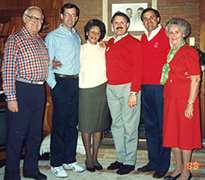
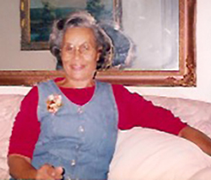

Wanda Jean Hill, June 7, 2021
Teaching colleague, friend, Larry Lewis


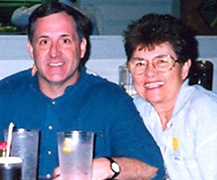
Harold & Betty Schmid, August 16 2019; Monday October 17, 2022
A truly good person and a good friend. We laughed, laughter slaughter, weird words, Covid & Trump news. We held hands, "Its hard."
• Betty invited Brooklyn and I to join them on the porch.
• Porch: treats for Brooklyn, Trump news, Covid news, word origins, sidewalkers, James Bailey report.
• Many jigsaw puzzles, card games with Neil, reading the paper.
• Feed ducks at Hafer, Braums Black Walnut shake & junior burger, Arby's Reuben.
• Covid: sitting outside, distanced, move to back if more people, some masking.
• Harold's illness and death.
• Family: Rob & Mary, Ruth & Gary, Dan & Darla, Sam & Kim; Will, Neil, Kathy
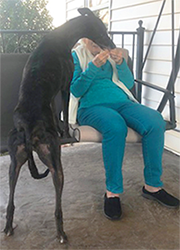
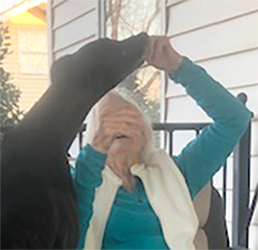




1902: Rocky Ford Farm, Coffee Creek
1926: Harold born
1930 October 23: Betty born
1930-39: Edmond, 215 W Main, 1st & 2nd grades Lowell school, 3rd grade Old North
1939: Gypsy, 1 year
1940-50: Depew
1947: Harold to Depew
1948: Graduated Depew High School
1948-49: Edmond: summer-spring, Jean: 15 E 4th
1949: Moline IL; Strombeck-Becker: made wood clowns
1949 August 15: wedding
1949-1952: Stillwater, OSU vet village,
1950: Visit parents in Boone, Iowa
1952: Bartlesville: rental house, Harold at Phillips
1953-1970: Dewey, GI house, Teacher
1970-2006: Bartlesville, (35 year teaching career)
2006-2022: Edmond, 4th St
2019, August 16: Harold died, age 93
2022, Sunday October 9: Betty and I held hands while sitting in her chair (photo above right)."Jim, it's hard. Its so hard."
2022, Monday October 10: Helped her stand at bed and rubbed her back, "Oh, that feels good." Helped her lie down.
2022, Wensday October 12: Said goodbye while holding her hand. "Betty, it's Jim." Gutteral moan: "Aack."
2022, Monday October 17: Text/email from Rob and Will. Betty died, age 91
2022, Saturday October 22: Betty interred at Graceland cemetery
2022, Saturday November 12: Memorial Service. Gather at house.
Nora Hughes, 1950 - December 6, 2022
Nora Hughes memorial service, Zoom Austin: March 19, 2023
TGIF: van trip, talk while drooling, Jamaice, Sondheim in Atlanta
Jim McLaren: Thank you so much for your donation. Your message meant a lot to me. Nora remembered her days at TGIF with great pleasure. Such a shame that the years separated us all. Truly Nora was an exceptional person - warm, intelligent, and accepting of all.
Brooklyn, rescued Greyhound, Tuesday, January 24, 2024
Some thoughts on Grieving
Experiencing deaths of loved ones (see list below) has taught me a lot - we each grieve and mourn differently. No one can truly understand one's personal relationship with the deceased and the void left in one's life. I have written in my journal many pages of remembrances, thoughts, and plans for future living. I met with a therapist and my doctor prescribed antidepressants. Its important to pamper oneself - to allow the emotions to surface and release. Because I choose to be single (my students are my 'kids'), the loss of a loved parent/friend was very significant. The deep sadness and emptiness required time and effort to overcome. Most of the time, I was fine; looking eagerly towards a good future. But the waves of grief sometimes overtook emotions and I felt the heavy loss.
Losing a loved one - while sad, tragic, and often catching us unprepared - is a great affirmation of life. It reminds us to celebrate the lost life, take inventory of those we treasure, and encourage us to live, love, and cherish each day.
Excerpts from How to Survive the Loss of a Love
When an emotional injury takes place, the body begins a process as natural as the healing of a physical wound. Let the process happen. Trust the process. Surrender to it. Trust that nature will do the healing. Know that the pain will pass, and, when it passes, you will be stronger, happier, and more sensitive and aware.
Other books to peruse
• The Grief Recovery Handbook
• A Journey Through Grief
• Healing Your Grieving Heart, 100 Practical Ideas
Stages of recovery
Recovering from a loss takes place in 3 distinct - yet overlapping - stages:
1. Shock/denial/numbness
2. Fear/anger/depression
3. Understanding/acceptance/moving on
Each stage of recovery is necessary, natural, and a part of the healing process.
Some of what I experienced
• The physical breakdown of human beings (and dogs).
• The fragility of the human body.
• The rollercoaster of emotions: pain, laughter (when tears were overwhelmed), sadness, and the joy of being alive and healthy.
• Enhanced creative output, maybe compensation for grief. Maybe I experienced the value of 'there really is nothing to fear' that frees the mind for creative thoughts.
• My capabilities and limits (or lack of) of compassion and care.
Some of what I learned
• How to mentally prepare for my own later poor health and care needs.
• Its okay and healthy to sometimes pamper myself - give myself permission to indulge. Grieving is not a great time to diet or change routine - we need familiarity, comfort, and to be centered and confident.
• Dogs love us at a level we humans often don't quite attain.
• I enjoy being a caregiver (I might even volunteer at a nursing home).
• Old people need care, compassion, and a listening ear. Some don't have that.
• Old people have fascinating stories to tell.
• I am more patient and understanding when old people are driving.
• Empathy for those who are unhealthy.
• Greater respect for my health and mental well being.
• The value of writing my inner thoughts and feelings in a journal.
• Nurses/health care people don't get paid enough (its frustrating that America favors military and killing over education and health care).
• We each experience grieving differently. All of our personal relationships are unique. No one truly understands what I am feeling.
• I should hug my friends more. Tell people I love that I do.
• What is really important at deathbed. Career achievements and material acquisitions really don't matter. Only the love and care of friends and family.
Online wisdom
The chances of you adding even a tiny bit of significance to your well-intentioned condolence is approximately zero. However, the chance of saying something offensive or outright stupid are significantly higher. So just say you're sorry for the loss and then shut up.
You don't know what they're going through because you also lost a loved one. You didn't have the emotional connection to the departed the way the other person did.
You'll be tempted to say what a wonderful person/pet they were, or some other flattering observation. You'll want to use words to expand on a point and wax poetic. Just don't. You'll end up waxing idiotic.
Remember the formula: Condolence + shut up = faux pas avoidance and social grace achieved.
When others grieve
I've also learned how to better deal with people who are grieving. I won't tell stories of a relative who died, how sad it was for me, or my experiences with grieving. These don't ease the pain of the grievant. More sad stories don't help. I won't wrest the focus away from the grievant with my own tales of woe.
The grievant is the one that is hurting and these comments don't help the grievant - the person is still gone, no matter to what wonderful place they may have gone:
• I know exactly what you are feeling. I've been there, done that.
You are making it about you and marginalizing the uniqueness of the person's experience. As a general rule, if the first word out of your mouth is the pronoun “I," the chances are excellent that you aren't displaying empathy.
• It could always be worse.
Telling someone in pain that it's really not so bad is undercutting and insulting. Fight the need to fill the air with words - just grab a seat and listen, because that's what true empathy looks like. No one needs to feel grateful that what happened was only a category-three hurricane and not a tsunami.
• Try to be positive. Maybe it was meant to be.
A true empath leaves their stash of positive-thinking magnets and memes at home. While you may think that this kind of cheerleading is exactly what someone needs to hear - "Life gave you lemons? Let's make lemonade!" - chances are that you're wrong. For most of us, the process of sorting out our feelings when something hurtful or destructive happens is a long one, and will need support. That support does not include people suggesting that this is a trial which will make us stronger - or any other clich's of that ilk. If, at some point, a person decides that's how he or she wants to view the experience, that's different.
• Don't you think it's time to move on?
Your inner cheerleader may think this is helpful, but the emotional distance implicit in sympathy becomes fully realized with this statement suggesting that grief, mourning, or recovery come with a use-by-date stamp like perishables in the supermarket, and that "wallowing" is bad for the soul. Unless you intend to make it clear to the person that you are sick and tired of their story - and you really don't mind losing the relationship - no one except the person suffering loss can decide when the moment is right to move on. Empathy is not judgmental.
I've learned to do three things
1. Ask if the grievant would like a hug (even though our culture says men shouldn't).
2. Ask if they would like to talk.
3. Offer to listen whenever they'd like and offer to hug whenever they'd like.
Nothing more need be done.
Don't cry because it's over, smile because it happened.


Wisdom from a veterinarian. Dogs are a gift in life like no other thing. I was once told that when we chose to live with beings whose life span is even more brief than our own that we live in a fragile circle. A circle which will often and sadly be breached. However, I cannot imagine a life so poor as what a life would be without the presence of a dog. Dogs give so much and ask so little in return. You were the sun and the moon and the stars to your girl. She trusted you to make all of her decisions for her, and you rose to that confidence that she placed in you. You always did your best for her and she thrived in the care which you gave to her. Her trust in you was earned by you with your devotion to her. Her life was blessed because she spent that life with you. Of course you grieve for what you have lost, but please, do find a moment here and there to remember all you had, and all she gave to you and the richness with which she enhanced your life. You were entrusted with your girl's care for her lifetime; you made that lifetime a heaven. I share the sadness of your loss and celebrate the life you gave to her. My thoughts are with you at this difficult time. My condolences, Marguerite
Why a dog death hits me so hard
• Humans have a nurturing, raising children instinct. I have chosen to be single, with no children. My dogs fill some of that void. I raised them - they become my kids. Kids shouldn't outlive their parents. Mine do.
• When one dies, it makes it more obvious that I am alone. And that can sometimes be depressing.
• Manhattan's illness and death came at the same time that I retired from teaching, sold the NY apt, and a friend died. Lots of loss.
Why losing a dog can be harder than losing a relative or friend
By Frank T. McAndrew
When some people see their friends mourn the loss of a pet, they often think it's an overreaction; after all, it's “just a dog." But, your own pet is never “just a dog." Many times, people grieve more over the loss of a dog than over the loss of friends or relatives. Research has confirmed that for most people, the loss of a dog is, in almost every way, comparable to the loss of a human loved one. Unfortunately, there's little in our cultural playbook - no grief rituals, no obituary in the local newspaper, no religious service - to help us get through the loss of a pet, which can make us feel more than a bit embarrassed to show too much public grief over our dead dogs. Perhaps if people realized just how strong and intense the bond is between people and their dogs, such grief would become more widely accepted. This would greatly help dog owners to integrate the death into their lives and help them move forward.
Dogs are the only animal to have evolved specifically to be our companions and friends - socially skilled animals that we now interact with in the same way we interact with other people. Dogs can be even more satisfying than our human relationships because dogs provide us with unconditional, uncritical, positive feedback. (As the old saying goes, “May I become the kind of person that my dog thinks I already am.") Dogs recognize people and can learn to interpret human emotional states from facial expression alone. Scientific studies also indicate that dogs can understand human intentions, try to help their owners, and even avoid people who don't cooperate with their owners or treat them well.
The loss of a dog is painful because owners aren't just losing the pet - they're losing a source of unconditional love, a primary companion who provides security and comfort, and even a protégé that's been mentored like a child. The loss of a dog can also seriously disrupt an owner's daily routine more profoundly than the loss of most friends and relatives. For owners, their daily schedules - even their vacation plans - can revolve around the needs of their pets. Changes in lifestyle and routine are some of the primary sources of stress.
Care & Feeding of your grieving person
You don't need to be perfect - just present. @refugeingrief


"My friend just died. I don't know what to do."
A response from some old guy on Facebook:
I wish I could say you get used to people dying. But I never did. I don't want to. It tears a hole through me whenever somebody I love dies, no matter the circumstances. But I don't want it to "not matter". I don't want it to be something that just passes. My scars are a testament to the love and the relationship that I had for and with that person. And if the scar is deep, so was the love. So be it.
Scars are a testament to life. Scars are a testament that I can love deeply and live deeply and be cut, or even gouged, and that I can heal and continue to live and continue to love. And the scar tissue is stronger than the original flesh ever was. Scars are a testament to life. Scars are only ugly to people who can't see.
As for grief, you'll find it comes in waves. When the ship is first wrecked, you're drowning, with wreckage all around you. Everything floating around you reminds you of the beauty and the magnificence of the ship that was, and is no more. And all you can do is float. You find some piece of the wreckage and you hang on for a while. Maybe it's some physical thing. Maybe it's a happy memory or a photograph. Maybe it's a person who is also floating. For a while, all you can do is float. Stay alive.
In the beginning, the waves are 100 feet tall and crash over you without mercy. They come 10 seconds apart and don't even give you time to catch your breath. All you can do is hang on and float. After a while, maybe weeks, maybe months, you'll find the waves are still 100 feet tall, but they come further apart. When they come, they still crash all over you and wipe you out. But in between, you can breathe, you can function. You never know what's going to trigger the grief. It might be a song, a picture, a street intersection, the smell of a cup of coffee. It can be just about anything...and the wave comes crashing. But in between waves, there is life.
Somewhere down the line, and it's different for everybody, you find that the waves are only 80 feet tall. Or 50 feet tall. And while they still come, they come further apart. You can see them coming. An anniversary, a birthday, or Christmas, or landing at O'Hare. You can see it coming, for the most part, and prepare yourself. And when it washes over you, you know that somehow you will, again, come out the other side. Soaking wet, sputtering, still hanging on to some tiny piece of the wreckage, but you'll come out.
Take it from an old guy. The waves never stop coming, and somehow you don't really want them to. But you learn that you'll survive them. And other waves will come. And you'll survive them too.
If you're lucky, you'll have lots of scars from lots of loves. And lots of shipwrecks.
Avoid saying these things to a friend (or relative or colleague) who's sick
By Bruce Feiler, The New York Times, June 2011.
Most patients I know grow to hate this ubiquitous, if heartfelt question because it puts the burden back on them. As Doug Ulman, the chief executive of Livestrong and a three-time cancer survivor, explained: "The patient is never going to tell you. They don't want to feel vulnerable." Instead, just do something for the patient. And the more mundane the better, because those are the tasks that add up. Want to be really helpful? Clean out my fridge, replace my light bulbs, unpot my dead plants, change my oil.
In my experience, some people think about you, which is nice. But the majority of people who say they're sending "thoughts and prayers" are just falling back on a mindless cliché. It's time to retire this hackneyed expression to the final resting place of platitudes, alongside "I'm stepping down to spend more time with my family," or "It's not you, it's me."
I was stunned by the number of friends and strangers alike who inundated me with tips for miracle tonics, Chinese herbs or Swedish visualization exercises. At times, my in-box was like a Grand Ole Opry lineup of 1940s Appalachian black-magic potions. "If you put tumeric under your fingernails, and pepper on your neck, and take a grapefruit shower, you'll feel better. It cured my Uncle Louie."
Unsure what to say, many well-wishers fall back on chirpy feel-goodisms. But these banalities are more often designed to allay the fears of the caregiver than those of the patient. As one who recently had brain surgery complained: "I got a lot of 'chin ups,' 'you're going to get better.' I kept thinking: You haven't seen the scans. That's not what the doctor is saying." The simple truth is, unless you're a medical professional, resist playing Nostradamus.
Every adult patient I know complains about being infantilized. When the adult patient has living parents, as I did, many mothers in particular fall back on old patterns, from overstepping their boundaries to making bologna sandwiches when the patient hasn't eaten them since childhood. "Just because someone is dealing with a physical illness," Mr. Ulman said, "doesn't diminish their mental capacity."
Nice try, but patients can see right through this chestnut. We know we're gaunt, our hair is falling out in clumps, our colostomy bag needs emptying. The only thing this hollow expression conveys is that you're focusing on how we appear. "When people comment on my appearance," Ms. Linn said, "it reminds me that I don't look good."
So what do patients like to hear?
All patients get overwhelmed with the burden of keeping everyone informed, coddled and feeling appreciated. Social networking, while offering some relief, often increases the expectation of round-the-clock updates.
To get around this problem, I appointed a "minister of information," whose job it was to disseminate news, deflect queries and generally be polite when I didn't have the energy or inclination to be. But you can do your part, too: If you do drop off a fruitcake or take the dog for a walk, insist the patient not write you a thank-you note. Chicken soup is not a wedding gift; it shouldn't come with added stress.
You'll never go wrong by uttering these five words while visiting someone who's sick. As Ms. Pogrebin observes of such visits, don't overstay your welcome. She recommends 20 minutes, even less if the patient is tired or in pain. And while you're there, wash a few dishes or tidy up the room. And take out the trash when you leave.
One surefire tip: a slight change of topic goes a long way. Patients are often sick of talking about their illness. We have to do that with our doctors, nurses and insurance henchmen. By all means, follow the lead of the individual, but sometimes ignoring the elephant in the room is just the right medicine. Even someone recovering from surgery has an opinion about the starlet's affair, the underdog in the playoffs or the big election around the corner.
When all else fails, simple, direct emotion is the most powerful gift you can give a loved one going through pain. It doesn't need to be ornamented. It just needs to be real. "I'm sorry you have to go through this." "I hate to see you suffer." "You mean a lot to me." The fact that so few of us do this makes it even more meaningful.
www.jamesrobertwatson.com/memoriam.html